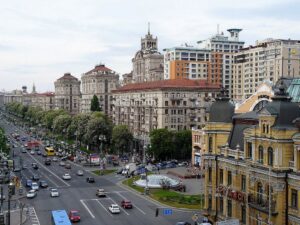
President of Ukraine Volodymyr Zelensky watched online the launch of the Ukrainian Sich-2-30 satellite into orbit, which took place from the launch site at Cape Canaveral in Florida (U.S.), the press service of the head of state reported.
“I believe that this is the beginning of a new phase of the space program of our state. Thanks to the Ukrainian satellite Sich-2-30, we will receive information not only from our partners, but also our own. This is very important,” the President said.
Together with Volodymyr Zelensky, the launch was observed by Head of the Office of the President Andriy Yermak, Secretary of the National Security and Defense Council Oleksiy Danilov, First Vice President of the National Academy of Sciences of Ukraine Volodymyr Horbulin, Head of the National Space Control and Testing Center Volodymyr Prysiazhny.
This spacecraft is a modified version of the Sich-2 satellite. It was delivered into Earth orbit by a SpaceX Falcon 9 launch vehicle. The last launch of a Ukrainian satellite took place more than ten years ago.
Chief designer and head of the design bureau of spacecraft, measurement systems and telecommunications at Yuzhne Design Bureau Kostiantyn Bilousov said that Sich-2-30 will provide Ukraine with access to information that it has not had for the past ten years.
According to him, the satellite is designed to receive digital images of the surface of our planet, which can be used in land use, agriculture and forestry, cartography, to control water resources and monitor emergencies and natural disasters in the field of security and defense when illegal activities are detected.
The Ukrainian satellite is also designed to monitor the main parameters of neutral and charged particles of the Earth’s ionosphere and measure the dose of accumulative radiation from cosmic radiation.
After launch, the satellite will be involved in the European Union’s Copernicus Earth Observation Program.
Head of the State Space Agency of Ukraine Volodymyr Taftai said that a lot of work had been done to fulfill Zelensky’s assignment regarding the launch of this satellite.
“We have not launched our satellites for more than eleven years. And this is actually a new era in the launch of Ukrainian-made satellites. I really hope that this is the first of eight satellites that will be manufactured as part of a strategic program that is awaiting approval by the Verkhovna Rada of Ukraine,” he said.
The spacecraft was developed and manufactured by SE Yangel Yuzhnoye (Pivdenne) Design Bureau together with the Ukrainian enterprises “Khartron-Arkos LTD” (Kharkiv), “NPP “Khartron-Yukom” (Zaporizhia), “Protection and automation of objects NIIRV” (Kharkiv), CB “Arsenal” (Kyiv), State Research Enterprise “Konex” (Lviv), Lviv Center of the Space Research Institute of the National Academy of Sciences of Ukraine, SE “Kyivprylad”.

The first resort town with an ecological philosophy, Dunaya Resort Ukraine in Tatarbunary district of Odesa region, will open in May 2023, project initiator Fazil Askerov has told Interfax-Ukraine.
“Our task is to open the first five hotels in May 2023. Then we will move at a rate of five to six hotels a year,” Askerov said.
As reported, the year-round resort with a gambling zone Dunaya is planned to be created on a spit between Lake Sasyk and the Black Sea. It is proposed to create 95 hotels and infrastructure facilities on 500 hectares. In the future, the hotels of the resort with 20,000 beds will attract about 6 million tourists annually. According to Askerov, the project will create about 25,000 new jobs, and in general, it will initiate the creation of up to 100,000 jobs in related industries. The Dunaya Resort Ukraine project was demonstrated as part of the Ukrainian pavilion at EXPO 2020.
On December 29, 2021, Odesa Regional Administration registered the state enterprise Dunaya with a charter capital of UAH 10,000.
According to Askerov, at the first stage, the tasks of the state enterprise Dunaya will be the registration of a land plot, the creation of a feasibility study and the development of a detailed plan of the territory.
“In order to attract investors, it is necessary to develop a preliminary project. In fact, at the first stage, Dunaya performs the functions of an investment nurse. After all, if you attract investors at the current stage with an unresolved status of the site, then the paperwork will take 15 years,” he explains.
After the launch of the project, Dunaya will act as a management company, namely, to monitor compliance with investment agreements and manage infrastructure facilities.
Askerov emphasized that when developing the concept, the experience of six countries was studied, which in the past 25 years have created gambling zones: Sri Lanka, Vietnam, South Korea, Georgia, Kazakhstan, and the Russian Federation.

The volume of the motor fuel market, including petrol, diesel fuel liquefied gas, in Ukraine, in 2021 increased by 6%, to 12.22 million tonnes, according to a press release from the A-95 Consulting Group.
According to the group, the growth of the market is dictated by economic activity and de-shadowing of the sector.
“The increase in supplies was the result of not only the growing economic activity, especially in the agricultural sector and road construction, but also comprehensive efforts to combat the illegal market. Part of the volumes were brought out of the “shadow,” but this sector, especially with regard to petrol, still accounts for up to 20% of the market,” Serhiy Kuyun, the director of A-95 Consulting Group, said.
According to A-95, the volume of diesel fuel and motor gasoline markets increased by 7% in 2021, to 7.97 million tonnes and 2.29 million tonnes, respectively. At the same time, the liquefied natural gas market showed negative dynamics for the first time in the last eight years, decreasing by 1% to 1.96 million tonnes.
Last year, in the structure of diesel fuel supplies, the share of imports increased in percentage terms from 84% to 86%. At the same time, the share of Russian diesel fuel decreased from 35% to 25% (2.05 million tonnes against 2.61 million tonnes in 2020), the main reason for which was the cessation of pumping through the PrykarpatZakhidTrans oil product pipeline.
At the same time, 2.89 million tonnes were supplied from Belarus in 2021, which amounted to 36% of the Ukrainian market against 30% of the share of Belarusian supplies in 2020.
A record volume of diesel fuel – 1.2 million tonnes, which is 1.5 times more than in 2020 – entered Ukraine by sea.
In 2021, Ukraine imported 1.28 million tonnes of gasoline, or 56% of the market volume. At the same time, Belarusian refineries supplied up to 1 million tonnes and retained their share in gasoline imports at the level of 2020 – 78%. The Polish concern Orlen increased deliveries by 11% over the year – up to 262,200 tonnes.
Domestic gasoline production in 2021 amounted to 1.01 million tonnes, demonstrating a 3% drop due to malfunctions at the Ukrtatnafta refinery last fall (the plant produced 880,000 tonnes of gasoline for the year).

The Experts Club continues a series of programs dedicated to the macroeconomics of Ukraine. The new issue analyzes the preliminary results of 2021.
“We create such analytical videos in order to increase the level of knowledge of the population in the field of economics and for easy visualization of a huge number of figures. Such content, of course, is not a “mass market,” but we do not strive for it either. We focus on a thinking and searching audience,” founder of the Experts Club project Maksim Urakin said.
The issue analyzes the change in the number of the population of Ukraine, the current unemployment rates, presents the labor market in the regional context. In addition, GDP indicators are given, the main trade partners of the country are named, trends and plans for the payment of Ukraine’s internal and external debt, as well as indicators of retail and inflation, are analyzed.
The video contains a large number of author’s charts, histograms, which conveniently illustrate the main macroeconomic trends.
The Experts Club is dedicated to political science, economics, science, futurology, contains expert opinions and analysis of the topics discussed.
This video is available for viewing at the link
https://www.youtube.com/watch?v=gUs6fF–F-c
You can subscribe to the channel at the Experts Club – YouTube link

The Antimonopoly Committee of Ukraine (AMCU) has allowed Orexim closed non-diversified venture corporate investment fund to increase its share in the charter capital of Ukrtranslogistic (UTL, Kyiv) to over 50%, whereas now this figure is 10%.
The state regulator made the corresponding decision at a meeting on January 13.
According to the unified state register of legal entities and individual entrepreneurs, the ultimate beneficiary of Orexim with a charter capital of UAH 504.7 million is Ukrainian businessman Yuriy Budnyk.
The investment fund is part of Orexim Group, the main activities of which are the export of agricultural products, port and logistics services. The group has offices in several cities of Ukraine, as well as abroad.
During its existence, the group has invested over $ 100 million in fixed assets.
According to the information on the UTL website, the company is engaged in the lease of railway wagons. Its wagon fleet consists of about 300 wagons, 62% of which are high-sided wagons, 27% are grain wagons, 11% are covered wagons.
According to the state register, Ukrtranslogistic with a charter capital of UAH 35,000 was founded in 2015. The majority shareholder of the company is Volodymyr Kustkov, who owns 31.34% of shares. In addition to him, shares of 10% in the company belong to Orexim and Alveor fund (Kyiv) belonging to Serhiy Kovalchuk and Yevhen Denisov.

Ukraine in 2021 left the list of the most vulnerable and less stable countries according to the Berlin company Scope due to its ability to continue accumulating foreign exchange reserves, improving the balance of payments and reducing payments over the past year, member of the Council of the National Bank of Ukraine (NBU) Viktor Koziuk has said.
“Berlin-based company Scope calculates the External Vulnerability and Resilience rankings. Last year Ukraine was in the most risky oval on the chart. It was among the countries that are most vulnerable and less resilient. This year Ukraine has left this oval. This creates a certain margin of safety,” he said in an exclusive interview with Interfax-Ukraine.
According to him, a certain improvement on the side of the external sector speaks of restrained optimism associated with vulnerability to external shocks.
“At the same time, Ukraine remains in the 80th place in terms of external vulnerability. That is, the probability that we have dropped out of this oval forever is not 100%. We need to work so that we do not return there,” the expert added.
Turkey, Armenia, Belarus and Georgia are in the list of the most vulnerable countries in 2021.